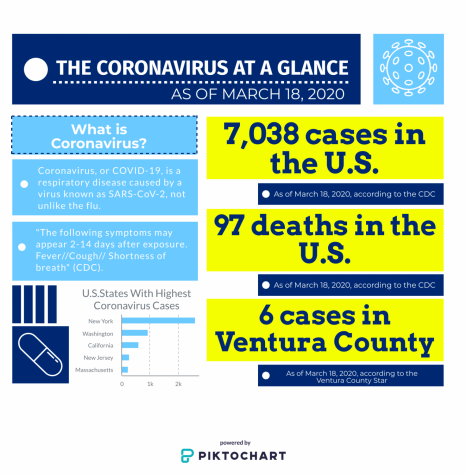The Invisible Anarchist: The Coronavirus, and what you need to know
Grocery store shelves in Ventura are emptied by shoppers due to COVID-19 panic.
March 19, 2020
In Dec. of 2017, the city of Ventura wore face masks to protect themselves from the destruction of the Thomas Fire. Three years later, the world would don masks yet again in response to the Coronavirus pandemic.
The World Health Organization declared the novel Coronavirus a global pandemic and there have been over 7,000 Center for Disease Control (CDC) confirmed cases of Coronavirus in the U.S. Meanwhile, the National Basketball Association (NBA) season has been suspended, air travel from Europe into the U.S. has been banned for the next 30 days and Italy has shut down many of the shops in the country.
Now, the Coronavirus, or COVID-19, has directly affected Ventura Unified School District. On the wet evening of March 12, 2020, it was announced that “the Ventura Unified School District Board of Education and superintendent have decided to close all VUSD schools beginning Monday, March 16 through Friday, April 10.” As of March 18, along with the transition to online learning, that date got extended to May 4. Now that the virus has had a major impact on our schools, it’s pivotal that the nature of the virus is understood.
The Basics

The Coronavirus at a glance
On March 12, 2020, the VC Star announced the third case of COVID-19 in Ventura County was confirmed by the CDC, which spurred on the announcement of a local health emergency within the county.
The true nature of COVID-19 is yet to be discovered, but currently, here is what’s known: COVID-19 is a respiratory disease that is spread from person to person. Although the disease can be spread to anybody, regardless of age, it is very dangerous for older adults and individuals with prior health ailments who may have weakened immune systems. Although there is no official worldwide mortality rate from the CDC or World Health Organization (WHO), the CDC estimated that, based on data from “82 countries, territories, and areas,” the fatality rate is 4.2 percent.
Transmission
The CDC says that “[t]he virus is thought to spread mainly from person-to-person[,] [b]etween people who are in close contact with one another (within about 6 feet) [and] through respiratory droplets produced when an infected person coughs or sneezes.” The symptoms of the disease show between 2-14 days of exposure and include fever, cough and shortness of breath.
The Virus
The abundance of terms regarding the virus can be confusing if uninformed. The World Health Organization named the new Coronavirus on February 11, 2020. To be clear, the virus itself is called SARS-CoV-2, and the disease it causes is COVID-19, or Coronavirus. Coronavirus is not a new virus, as coronaviruses are common among animals and humans. However, the coronavirus discovered in Wuhan has not been previously identified, and is thus named COVID-19.
Remember
Not only is the geopolitical situation rapidly evolving, but the details regarding SARS-CoV-2 as a virus have not been completely demystified. Keep in mind that the exact effects of COVID-19 have not yet been discovered.
Frequently Asked Questions
Q: Why are grocery stores and hospitals running out of items like toilet paper and face masks?
A: The recent announcements, closing of schools and growing number of COVID-19 cases in the U.S. have caused widespread panic, which has led many Americans to buy and store rolls of toilet paper. “Stockpiling is not an uncommon reaction provoked by fear, social scientists say. Fear of running out. Fear of the unknown and what is to come,” said the Washington Post.
The same goes for facial masks, but at a greater consequence. Hospitals have run low on masks, which, considering the airborne nature of the disease, has made patient examination particularly dangerous.
Q: Who is at a higher risk?
A: The CDC says that “people who have serious chronic medical conditions like: Heart disease[,] Diabetes [and] disease” are at higher risk of getting very sick from the illness. Additionally, The New York Times said that smokers, immunocompromised individuals and diabetic/cancer patients are more vulnerable.
Q: Why is everyone making a big deal out of it?
A: Although the disease has only killed 36 people in the U.S., the airborne nature of the disease allows it to spread easily. Healthy children, teenagers and adults have not been shown to be at risk for severe symptoms. However, the virus is a worry for groups of people at higher risk.
Q: How will this affect Advanced Placement(AP) Tests?
A: The College Board has said the following: “we’re focused on […] providing flexible and streamlined testing opportunities and partnering with colleges and universities to ensure that students can still receive the college credit they have been striving to earn.” Schools that are open during the May 4-8/11-15 testing window will have the test during those dates, and late testing will take place from May 20-22.
Q: How do I prevent the spread of COVID-19?
A: Multiple sources including the World Health Organization and CDC recommend avoiding crowds and keeping hands washed. Schools have been closed in the interest of social distancing, so a general rule of thumb is to stay at home unless necessary.
Editor’s Note: The Foothill Dragon Press surveyed over 100 Foothill students and received several recurring questions regarding the virus, these questions determined those addressed in the “frequently asked questions” portion of this article.















Anonymous • Mar 27, 2020 at 1:46 pm
Our president is handling this excellently! This really is his time to show off his leadership abilities.